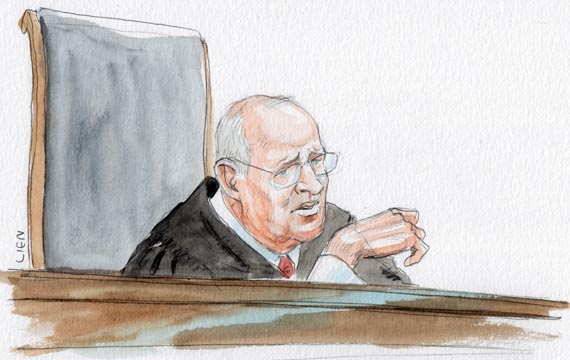Tribute: Seeing Justice Kennedy think

on Jun 29, 2018 at 10:39 am

Richard M. Re is an assistant professor at UCLA School of Law. He served as a law clerk to Justice Kennedy during the October 2010 term.
When I began law teaching, I asked Justice Anthony Kennedy for advice. I had clerked for him a few years before and knew that he had taught hundreds of law students in America, Europe and elsewhere. His advice: “Let them see you think.” For Kennedy, engaging with hard issues – deliberately, honestly, and independently – is a critical skill to teach by example. He applied a similar approach to judging.
Supreme Court practice will not be the same without Kennedy, and something will be lost as a result. Because of his pivotal position on the court, lawyers and commentators have spent years, even decades, trying to get inside Kennedy’s mind. That habit led to a lot of false predictions and fawning citations to his opinions — but it had a silver lining. It forced the profession to think sympathetically about principled positions that cut across the familiar views expressed in party platforms and ACS or Fed Soc conventions.
Kennedy’s final opinions exemplify those challenges. Is there good reason to support abortion rights and gay marriage but also insist on robust First Amendment safeguards for their opponents? How can someone overcome national-security deference to the political branches when alleged terrorists are held at Guantanamo Bay, but yield in the face of the Trump travel ban? At times, similar tensions resulted from changes of heart, such as when Kennedy reconsidered his views on affirmative action. As he once said, “To re-examine your premise is not a sign of weakness of your judicial philosophy. It’s a sign of fidelity to your judicial oath.”
Future rulings will also lack Kennedy’s distinctive writing style, which is marked by abstract language, emphatic repetition and few or no adverbs. More substantively, Kennedy tended to obscure or evade the doctrinal categories that preoccupy most legal textbooks. For example, he famously resisted the false sense of security that comes from using “tiers of scrutiny” and related jargon when the real analytical work happens elsewhere. On balance, that approach fostered candor and transparency.
Critics poke fun at some of Kennedy’s most lavish and enigmatic passages. But whether you view Kennedy’s approach as opaque or charming, it was sincere. And it often had lasting effects precisely because it defied legal conventions. The best example: Kennedy’s historic same-sex marriage ruling understandably came in for criticism for failing to track doctrinal categories. But his opinion spawned a widespread practice of reading those nondoctrinal passages at weddings. It is hard to imagine a better rhetorical legacy.
Kennedy’s retirement has of course prompted an outpouring of commentary including generous praise, vicious condemnation and everything in between. In one sense, this array of views is fitting. Kennedy, after all, has been devoted to free and open public debate perhaps above all other legal values, even though — or because — he knows how messy that process can be. And there is plenty of room to disagree with features of Kennedy’s vast jurisprudence.
But at the end of perhaps the most influential judicial career in a century, Kennedy deserves respect and our best efforts at understanding. And I think he will ultimately receive both. Kennedy represents a distinctive judicial philosophy marked by two words: freedom and dignity. Those values are united for Kennedy in that each requires and demands the other. To lead a dignified life is to speak, worship, work and love freely. Other values, including equality, responsibility, and, yes, civility are all important but derivative. Kennedy wants choice first, even if it means choices that go wrong.
By letting us see him think through these complex issues, Kennedy helped reveal the tensions and judgment calls that make the hard cases of constitutional law so hard. And because he not only surfaced those difficulties but also offered his own approach to them, Kennedy’s views will abide in the law for years to come. The next justice would do well to take Kennedy’s work seriously. And he or she almost certainly will.


